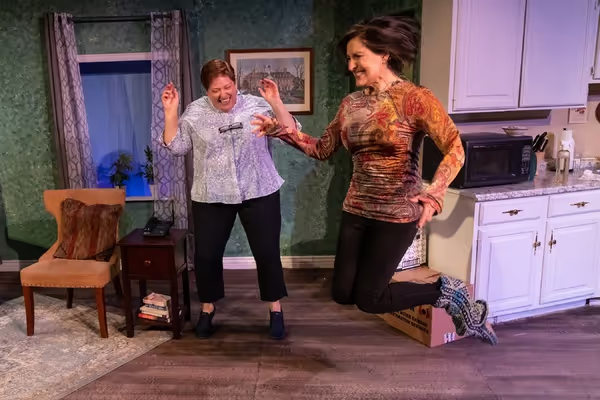Vintage Theatre production of Jen Silverman’s dark comedy runs through Feb. 19
It all starts out fairly innocuous: Sharon is looking for a roommate. Robyn is looking for a place to live. On the surface it’s a seemingly copacetic arrangement. However, over the course of two hours and 30 minutes, it all unravels at an alarming rate.
The Roommate by Jen Silverman is a fast-moving dramedy with clever dialogue and well-developed characters. Set in Iowa City, Sharon is recently divorced and fills her days with friends through a book club. Robyn is from the Bronx and is looking to start over again by simply wiping her slate clean. As they first meet, there is rapid-fire dialogue between the two women, offering comparisons to living in Iowa versus the Bronx. Sharon is curious about how one can live in the Bronx with danger lurking around each corner, while Robyn is amazed by the simplicity of Midwestern life.
But it’s clear from the beginning that Robyn has something to hide. Her responses are non-committal as Sharon pries into Robyn’s personal and professional life. On the surface, Sharon is an open book; Robyn not at all. It borders on a cat-and-mouse game at times. But curiosity gets the better of Sharon as she digs deeper and deeper into Robyn’s life until she eventually uncovers her deepest secrets and her real reason for leaving the Bronx.
But it doesn’t stop there. A question The Roommate poses is how we, as individuals, can be influenced by those around us and what happens when one or both in a relationship goes overboard. This is certainly the case with Sharon — much to Robyn’s displeasure. But perhaps Sharon is merely trying to fill her life with something bigger and more exciting. On the flip side, Robyn is seeking to escape her past with fierce resistance.

Each of the characters are well defined, both by the playwright and by the actors. As Sharon, Mari Geasair is appropriately well intentioned and accepting. But she also has a more aggressive streak that comes out as the play progresses. Her performance is solid and thoughtful. On the flip side, Christine Kahane as Robyn has developed what one might consider a tried-and-true New Yorker, which creates an underlying tension during much of the play. These are both strong actors delivering the highest-caliber performances.
As directed by Bernie Cardell, the play moves along at a quick pace and never falters. From the opening “social dance” between the two women, to the final emotionally wrenching moments of the play, each beat is carefully thought out and executed.
The set design, also credited to Cardell, is perfectly representative as the kind of home Sharon would feel comfortable in. Maybe not so much Robyn, however. It is perhaps too spacious and seemingly without many potential hiding places. Costume designer Susan Rahmsdorff-Terry makes subtle character statements with each women’s wardrobe.
Eric Fitzgerald started producing plays when he was 5 years old. He spent eight years in New York City as a talent agent representing well-known actors and actresses. Fitzgerald also worked for the ABC Television Network for 12 years both with ABC News and ABC Daytime. He lives in Aurora with his cat Max.


Leave A Comment